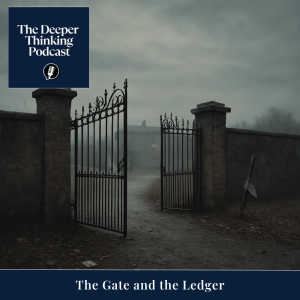
Saturday Mar 29, 2025
Who Deserves Help? (The Gate and The Ledger) : The Philosophy of Deservedness and the Workhouse Legacy - The Deeper Thinking Podcast
Who Deserves Help? The Philosophy of Deservedness and the Workhouse Legacy
The Deeper Thinking Podcast
Who decides if someone is worthy of aid? And what happens when help becomes a judgment rather than a gift? This episode unearths the moral logic behind the 1834 Poor Laws — where help was designed to hurt, and relief required the performance of virtue. But this isn’t just history. The legacy of deservedness lingers in every modern welfare system, policy form, and silent refusal.
The idea that people must earn help — by their labor, their compliance, or their suffering — is so embedded in our systems that we rarely question it. But what if the very act of moral filtering is the problem? Drawing from Bentham’s utilitarian logic, Malthusian fear, and Rawlsian justice, this episode reframes help not as something distributed by merit, but as something denied through design.
We follow the architectural cruelty of the workhouse, the silence of bureaucracy, and the emotional toll of being deemed undeserving — not just historically, but now. In this atmosphere of quiet exclusion, the question persists: who must suffer, and how visibly, before we offer care?
Why Listen?
-
Explore how 19th-century policy reshaped moral ideas about poverty, productivity, and worth
-
Understand how modern welfare systems still echo workhouse logic
-
Examine philosophical alternatives to merit-based care — Rawls, Sen, care ethics
-
Hear a compelling philosophical audio essay told through third-person narrative and historical tension
Further Reading
As an affiliate, we may earn from qualifying purchases through these links.
-
A Theory of Justice by John Rawls — A foundational text on fairness and distributive justice.
-
In a Different Voice by Carol Gilligan — Introduces care ethics as a moral and political framework.
-
The 1834 Poor Law Amendment Act — Primary source context for the historical pivot explored in the essay.
Listen On:
Abstract
This audio essay interrogates the philosophical foundations of deservedness within systems of social aid, tracing the origins of moralized welfare through the 1834 Poor Law Amendment Act in England. By examining how utilitarian and Malthusian ideologies reshaped poverty as a moral condition, the essay reveals how suffering was institutionalized as a test of worth. The workhouse system—engineered to deter rather than assist—serves as a historical case study in the weaponization of help. Drawing from the ideas of Jeremy Bentham, Thomas Malthus, John Rawls, Amartya Sen, and care ethicists such as Carol Gilligan, the episode critiques how modern welfare systems continue to encode suspicion and judgment into their very design. Ultimately, the essay asks whether help must be earned, or whether it can be reclaimed as a right grounded in shared vulnerability and political responsibility.
Bibliography
Arendt, Hannah. Eichmann in Jerusalem: A Report on the Banality of Evil. New York: Penguin Classics, 2006.
Bentham, Jeremy. An Introduction to the Principles of Morals and Legislation. Oxford: Clarendon Press, 1907.
Gilligan, Carol. In a Different Voice: Psychological Theory and Women’s Development. Cambridge, MA: Harvard University Press, 1982.
Malthus, Thomas Robert. An Essay on the Principle of Population. London: J. Johnson, 1798.
Rawls, John. A Theory of Justice. Revised Edition. Cambridge, MA: Belknap Press of Harvard University Press, 1999.
Sen, Amartya. Development as Freedom. New York: Anchor Books, 2000.
United Kingdom Parliament. Poor Law Amendment Act 1834 (4 & 5 Will. IV c. 76). London: Her Majesty’s Stationery Office.
No comments yet. Be the first to say something!